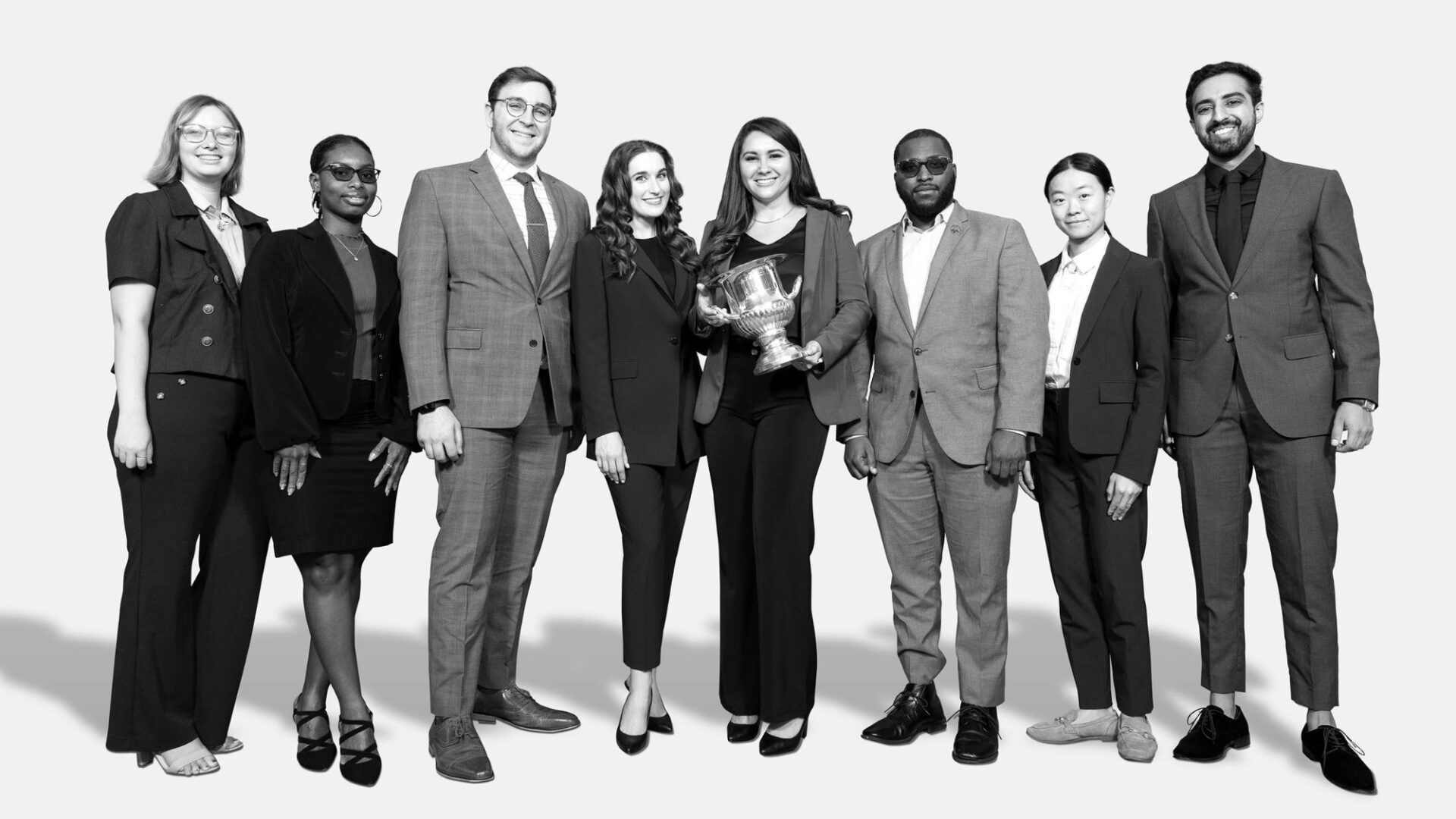This is an extended version, with bonus content, of a story that appeared in the Fall 2024 issue of Texas Law Magazine.
Last October, a team of six Texas Law students—3L Tori Holder and 2Ls and Alex Campagna, Monica Dike, Noah Hoffman, Ruona Odharo, and Kacey Simmons—won first place at the Martin Luther King, Jr. National Civil Rights Trial Competition in Sacramento, California. Hoffman also won an individual award for Best Opening in the preliminary rounds. The team was coached by Professor Sharon Baxter and Liliana Jayme ’22.
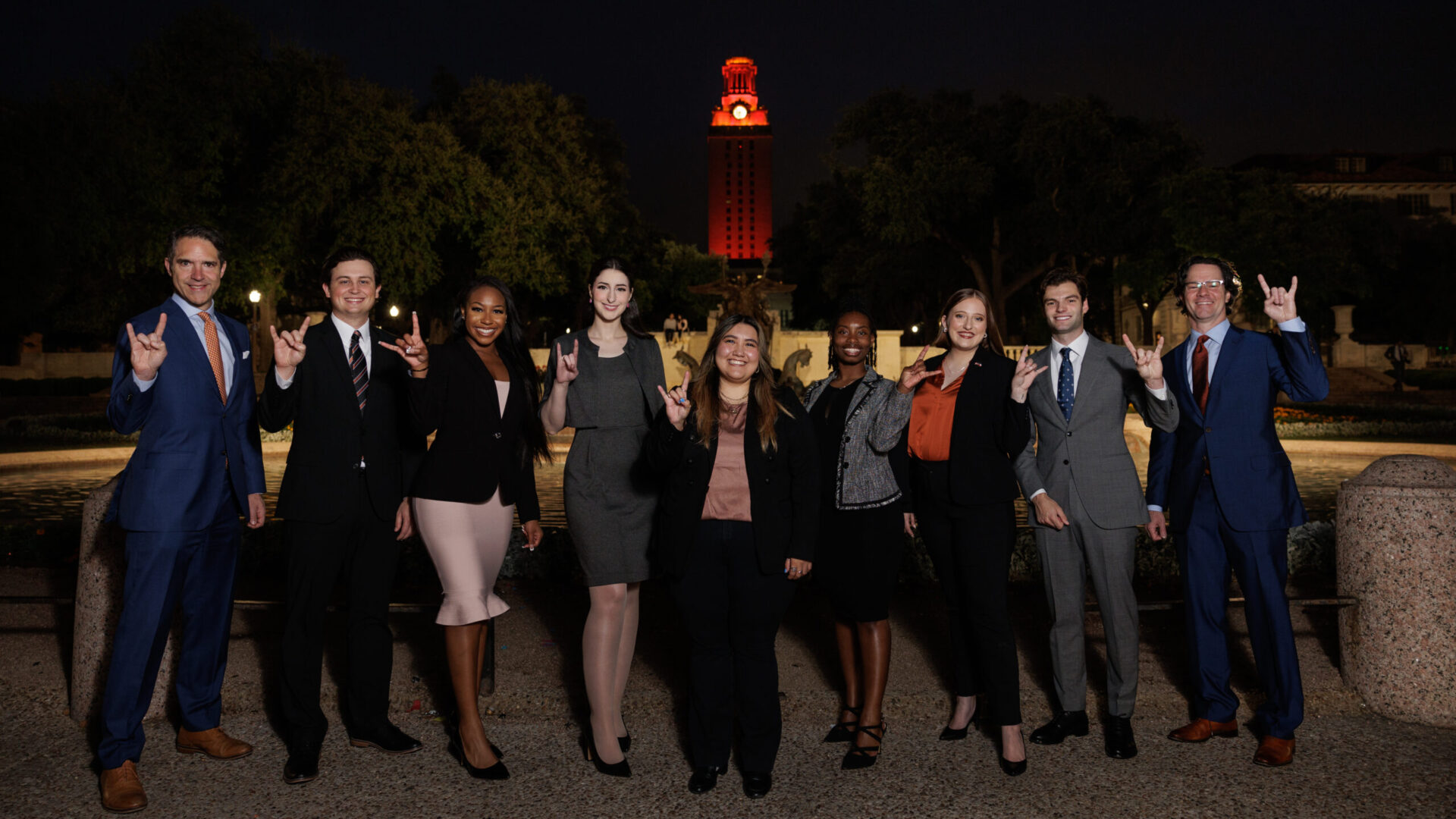
Other recent victories include the 2024 Georgetown White Collar Criminal Competition and the 2024 Duberstein Bankruptcy Moot Court Competition; the 2023 Admiralty Moot Court championship; as well as taking regional championships at 2023 IP Moot Court, the Phillip C. Jessup International Moot Court in 2023, and the TYLA National Trial Competition in 2024; plus a host of individual bests for student advocates.
These major interscholastic wins are evidence of Texas Law’s long and successful history in trial advocacy, which began with a student organization in the late 1950s. But courtroom competition represents just one component of a broad effort designed to make Texas Law students into better advocates—whether they’re in the courtroom or not. In fact, several years ago, former director Tracy McCormack ’87, now a senior lecturer at the law school, decided the trial ad program should become the Advocacy Program.
McCormack led the Advocacy Program from 2000 to 2022, garnering support and resources for advocacy at Texas Law, bringing together courses, adjunct faculty, and coaches—mostly Texas Law alumni—into a single program delivering what is now a gold-standard for experiential learning. “Everyone has a client,” she says, “and advocacy is universal.”
The history of program includes leadership like McCormack and Pat Hazel ’71, and Larry Neiman ’62 before them. “I’m really proud of what this program does,” enthuses Mike Golden ’01, who took the reins as director of the Advocacy Program in 2022.
“I didn’t build this Cadillac,” says Golden, a former employment litigator. “I didn’t put the gas in the tank or fill the tires with air. I’m just the lucky guy who gets to drive it around. Now we’re driving this Cadillac and we’re going to take it out for a spin. We’re going to see how far and fast we can go.”
In other words, Texas Law is on the move. “If you want to study courtroom advocacy with some of the smartest students in the whole country, this is the place to do it,” says Golden, who himself enrolled in the program as a Texas Law student and as a 3L was mentored by McCormack.
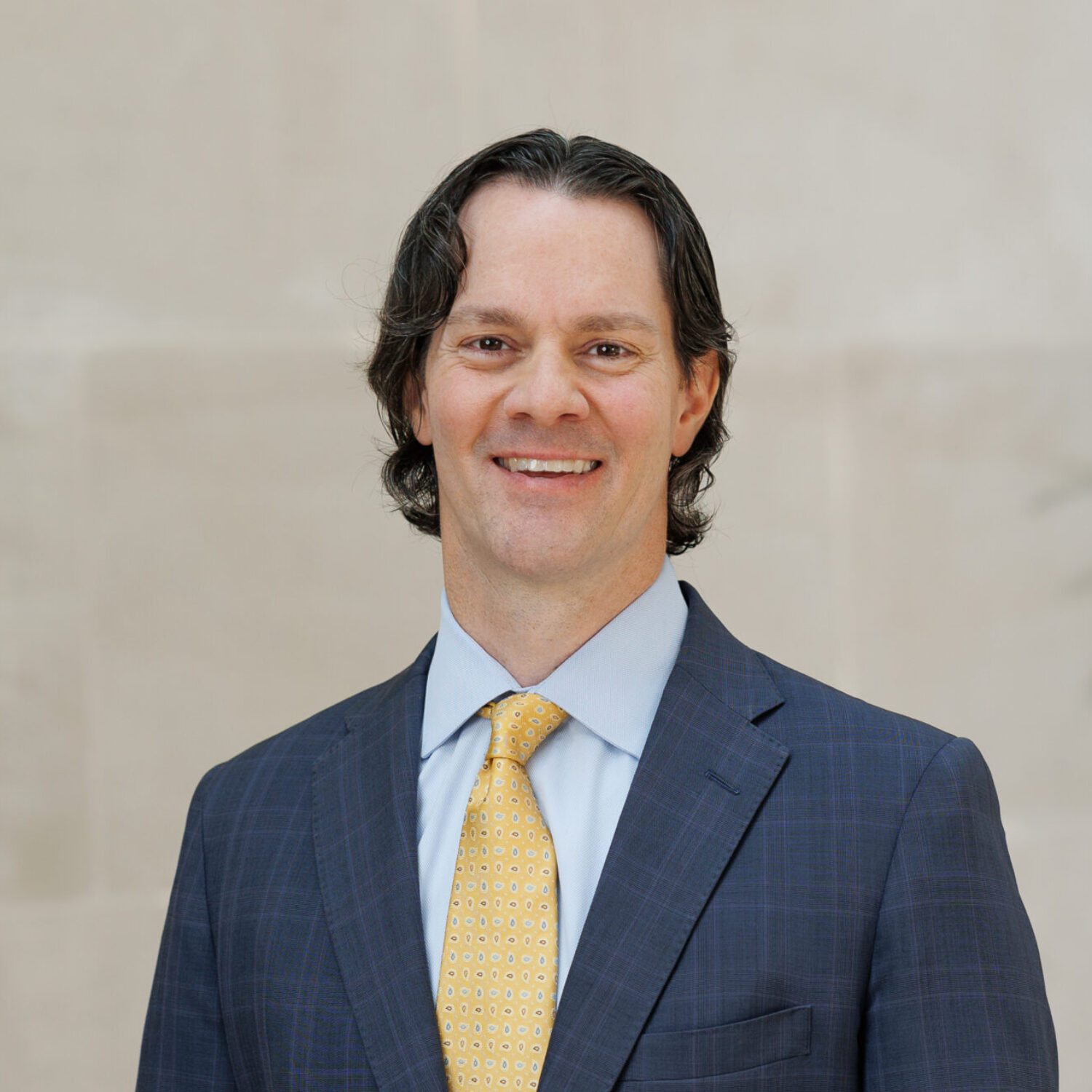
If you want to study courtroom advocacy with some of the smartest students in the whole country, this is the place to do it.
Mike Golden
“I believe we have a responsibility as a law school, and as an advocacy program to defend our constitutionally protected right to a jury trial, as fewer and fewer lawyers have jury trial experience,” Golden says. “And as more companies try through things like arbitration agreements to find ways around juries, we have an obligation to protect this constitutionally enshrined right to a jury trial in civil cases. And the only way we can do that is with excellent trial lawyers.”
Program Components
Lawyers employ their advocacy skills to persuade audiences on behalf of clients. Golden explained that advocacy falls into three categories: trial advocacy in courtrooms, appellate advocacy at courts of appeal, and alternative dispute resolution, which involves arbitrations and mediations.
At Texas Law, the program has three broad components. First is classroom instruction, which included 11 classes offered in the 2023-2024 academic year, or two to three times more than typically offered at other law schools, including advanced trial advocacy specifically focused on civil and criminal cases, taking depositions and dealing with expert witnesses, and advanced strategic planning in civil litigation.
Second are competitions—intramural mock trials that simulate a jury trial and moot court competitions that simulate an appellate argument organized by the school’s student-run honorary advocacy organization the Board of Advocates and interscholastic teams coached by working lawyers.
Finally, the program offers an extensive calendar of informal learning opportunities such as the Fall Litigation Institute and, for 1Ls, the Public Speaking Workshop. In the last academic year, more than a quarter of Texas Law students participated in the advocacy program.
With more in-depth courses and informal options, students are better prepared not only for competition but are day-one ready for practice. In the Advocacy Program, we “give students the skills and the confidence—and even the vocabulary—to convince senior lawyers early in their career, ‘I’m someone you can trust to do a direct exam. I know I’m a second-year lawyer, you can trust me to stand up in front of this judge, to argue this motion, to take this witness. Because I know what I’m doing,’” says Golden.
Students agree. “The classroom is a great place to learn new concepts,” observes Hoffman, a member of the six-person MLK competition championship team. “Competition quickly exposes your weaknesses in a way that is hard to replicate—when the lights are on and there is no safety blanket, you get to see what you’re really made of.” Following graduation, he plans to return to his hometown of Des Moines, Iowa, to spend one year as clerk for Justice Matthew McDermott of the Iowa Supreme Court and then plans to work in private practice doing commercial litigation.
Competition Ready
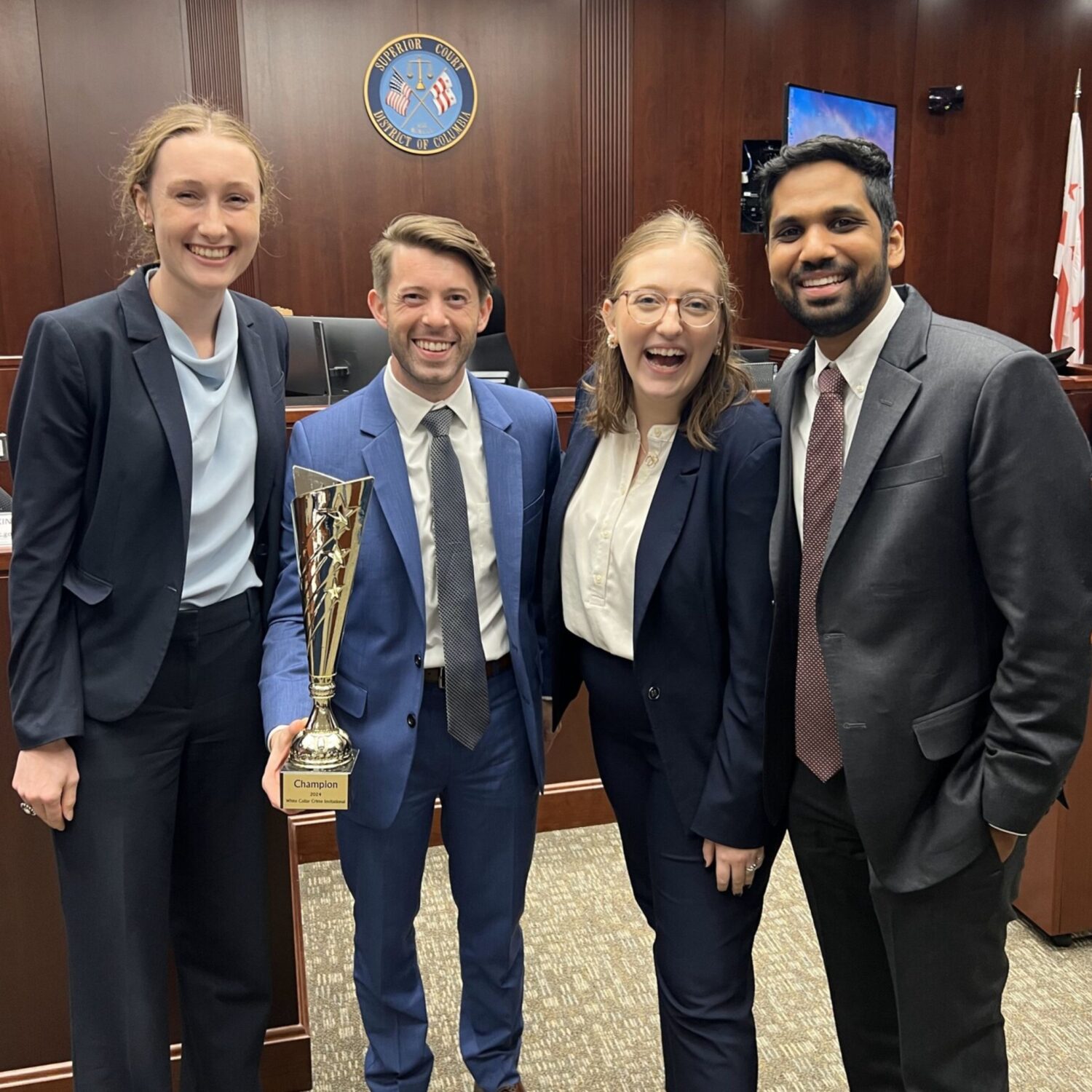
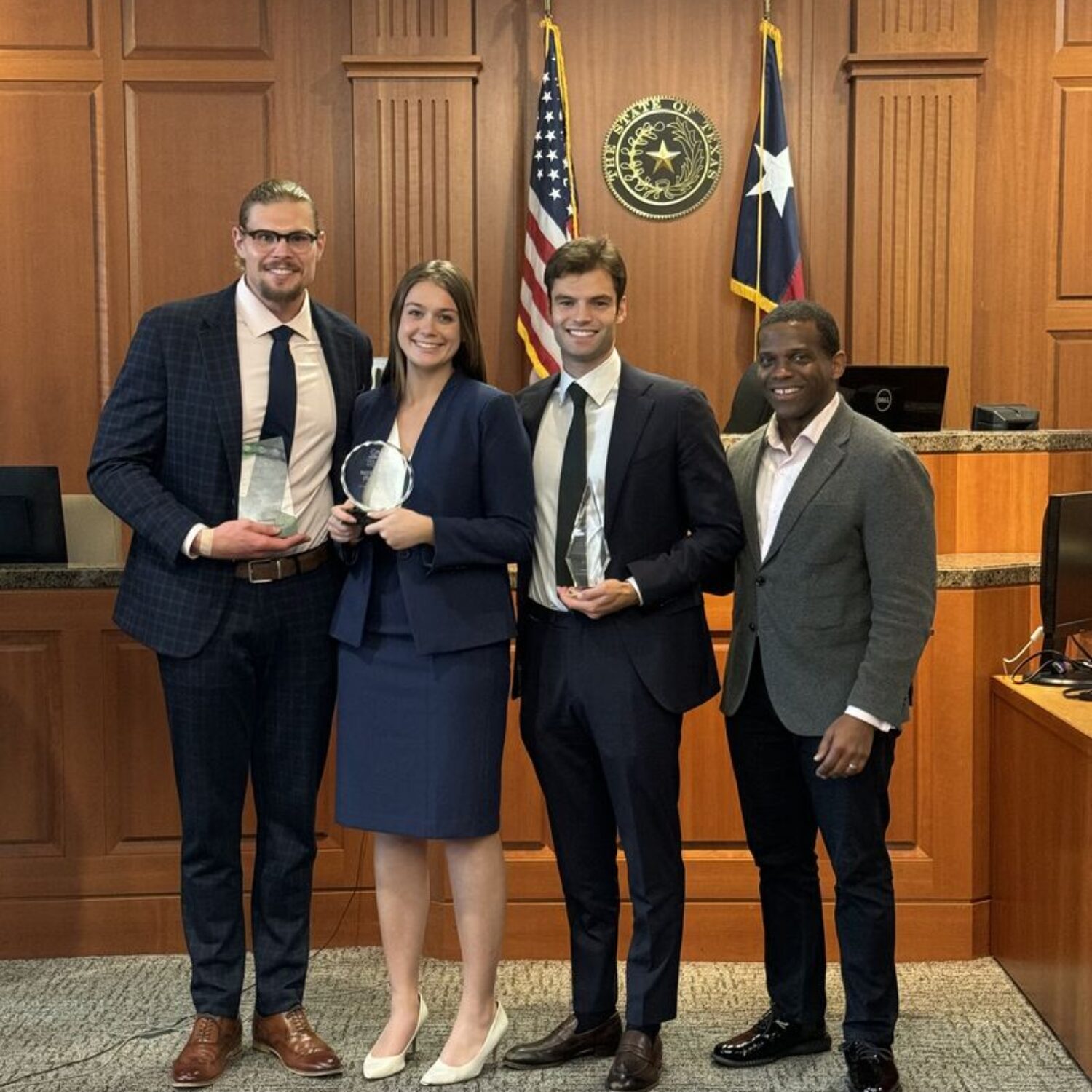
“Mock trial and moot court allow students to gain valuable skills, such as verbal and written communication, collaboration, and practical skills, to help them become successful advocates and litigators,” says 3L Caleb Hill, chair of the Board of Advocates, who following graduation will be an associate in the business and regulatory section of Bracewell LLP’s Houston office.
“And especially communication in the legal field, because speaking in a courtroom is very different than having a normal conversation,” Hill says.
Dike, also on the winning MLK Competition team, lauded the advocacy program for teaching students to think on their feet. Despite being very well prepared, the team faced unexpected challenges in mock trial. “I truly gained a valuable skill by learning how to quickly shift my argument or respond to an objection, which I am grateful I will not have to experience for the first time as a practicing attorney,” she says.
Her teammate Hoffman points to two ways the program readies students for the unexpected. First, through foundational concepts, such as in the Advocacy Survey class which teaches students to conduct a witness examination, argue a motion, and object to evidence, offering something of a template that “can be filled in with the specific facts of a case or situation.” Additionally, pre-mock trial competition practice scrimmaging involves “a whole stable of coaches, practitioners, former students, and students not currently on a competition team who are willing to form ‘spar teams’ that try the case against the competition team,” Hoffman says.
The MLK Competition—which Dike describes as “nothing short of amazing”—was her first mock trial experience. “My coaches and teammates made it possible, even fun, to jump into the deep end and come out victorious round after round,” Dike says. “I fell in love with the experience; now I am confident that I have a future in trial law.”
After graduation, Dike will join Bell Nunnally in Dallas as an associate. “I am excited to be joining a firm that affords me the opportunities to further exercise and practice my advocacy skills,” she says.
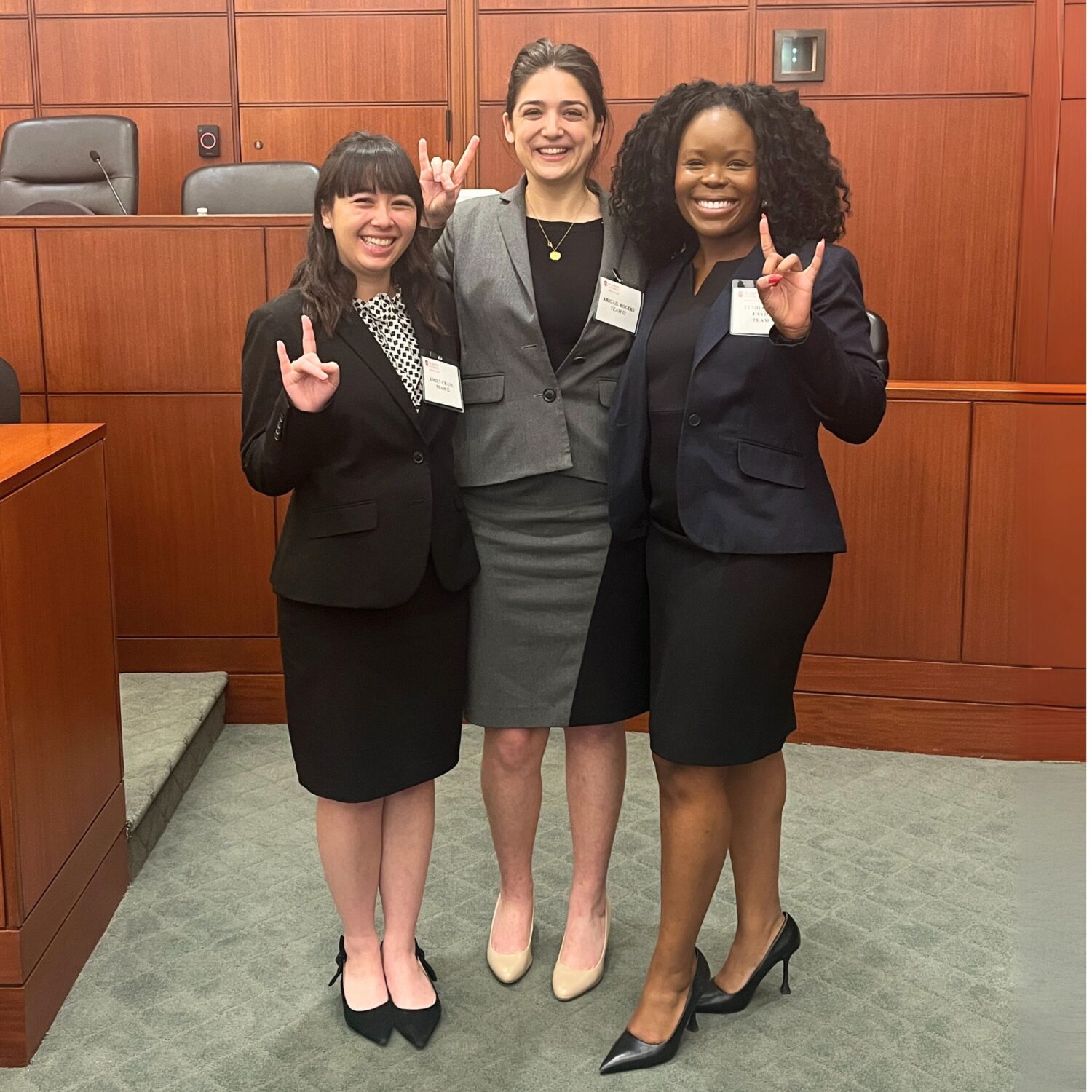
Emily Chang ’24, a clerk for Chief Judge Stacey G. C. Jernigan at the U.S. bankruptcy court for the Northern District of Texas, participated in competition as both a 2L and 3L. She was on the team, alongside Abby Rogers ’24 and current 3L Temi Fayiga, that won the Duberstein Bankruptcy Moot Court Competition in March 2024. “Duberstein was by far my favorite law school experience,” Chang says. “From practice all the way to competition, for both years I competed I felt supported and challenged in the best ways. Winning was just the icing on the cake!”
Golden Path
To Golden, this is a deeply personal refrain.
“It is no exaggeration to say that my entire career path was shaped by the Advocacy Program,” Golden says. “I learned that I was meant to be in the courtroom the first time I tried a mock trial round.” Golden was on the national championship team that won the Tournament of Champions in 2000.
Named a chancellor his 3L year and member of Texas Law Review, Golden built his career on trying cases, first as an associate at one of the nation’s elite Big Law firms then forming his own, Boulette Golden & Marin LLP.
“Tracy McCormack helped me—like so many others—with a simple piece of advice: the best way to reach and persuade an audience, to connect with them, is to be your genuine self,” Golden says. “Tracy, whom I count as a close friend, was my mentor and one of my very favorite teachers in law school. But she taught me very early on that I couldn’t aspire to be her; if I wanted to be successful, I needed to be me.”
While Golden notes that the Advocacy Program is aimed at those wanting to spend their careers in a courtroom, “there is an enormous benefit for every single person who wants to be a lawyer,” he says. “Every lawyer has clients and advocacy is universal. All lawyers can employ the skills of persuasion in a job interview, while pitching clients, interacting with opposing counsel, or when speaking to the media.”
“No matter how far you think your legal career will be from a courtroom, sooner or later something is going to go wrong,” Golden explains. “And when things go wrong, they get settled in a courtroom. Our students are ready for that.”
Changing Lives
That was clearly the case for mock trial coach and Professor Jay Ellwanger ’01, founding partner of Ellwanger Henderson, an equal rights and employment discrimination firm with offices in Austin and Dallas. An avid and successful competitor during his law school days, Ellwanger says the experience played a key role in securing his first job with a large Texas firm when he graduated.
Participating in the Advocacy Program is the No. 1 thing students can do to prepare themselves for the courtroom.
Jay Ellwanger ’01
“Participating in the Advocacy Program is the No. 1 thing students can do to prepare themselves for the courtroom,” he says, by getting students ready for “high-level advocacy” immediately following graduation. Ellwanger devotes considerable energy to teaching and coaching. “It’s a great way to give back to Texas Law,” he says. But it benefits him too: “Coaching keeps my skills sharp, improves my critical thinking, and my understanding of what young lawyers face. And I find young attorneys who want to work at our firm.”
There’s a larger program mission at work, too. Beyond the courtroom or law office, McCormack emphasizes the broader societal importance: “Advocacy is fundamental to democracy and justice.”
And Golden says the Advocacy Program shapes law students for the trials ahead. “I judge our success by students who come up to us and say, ‘This program made a difference to me; this program literally changed my life.’”
